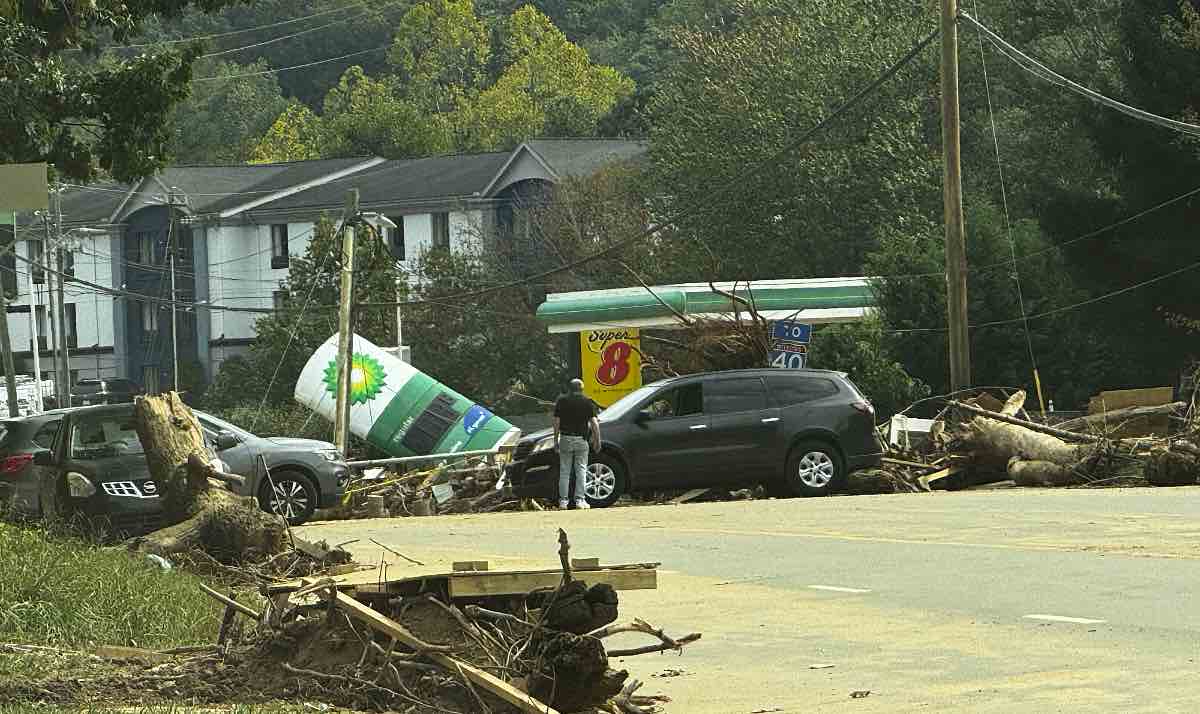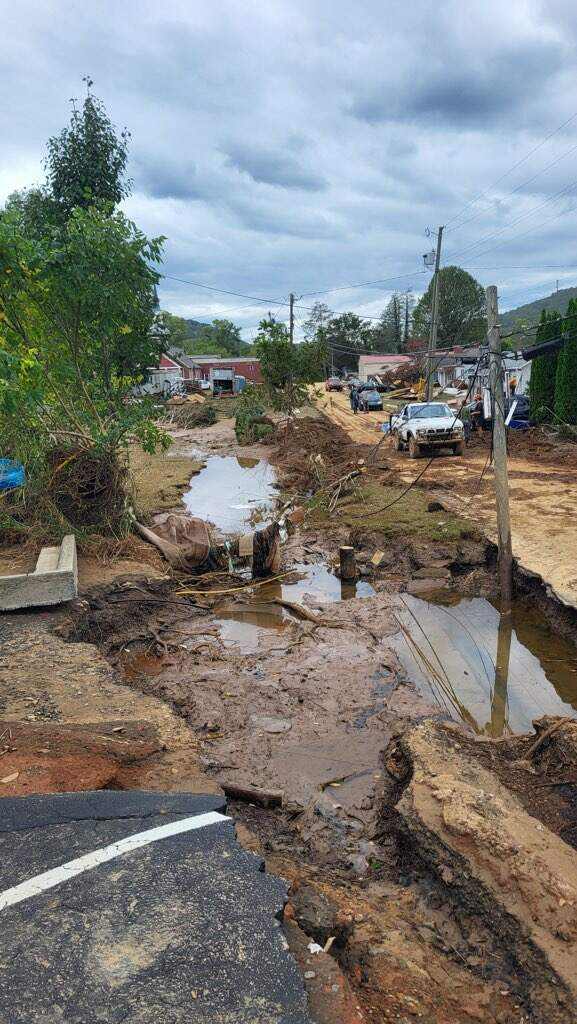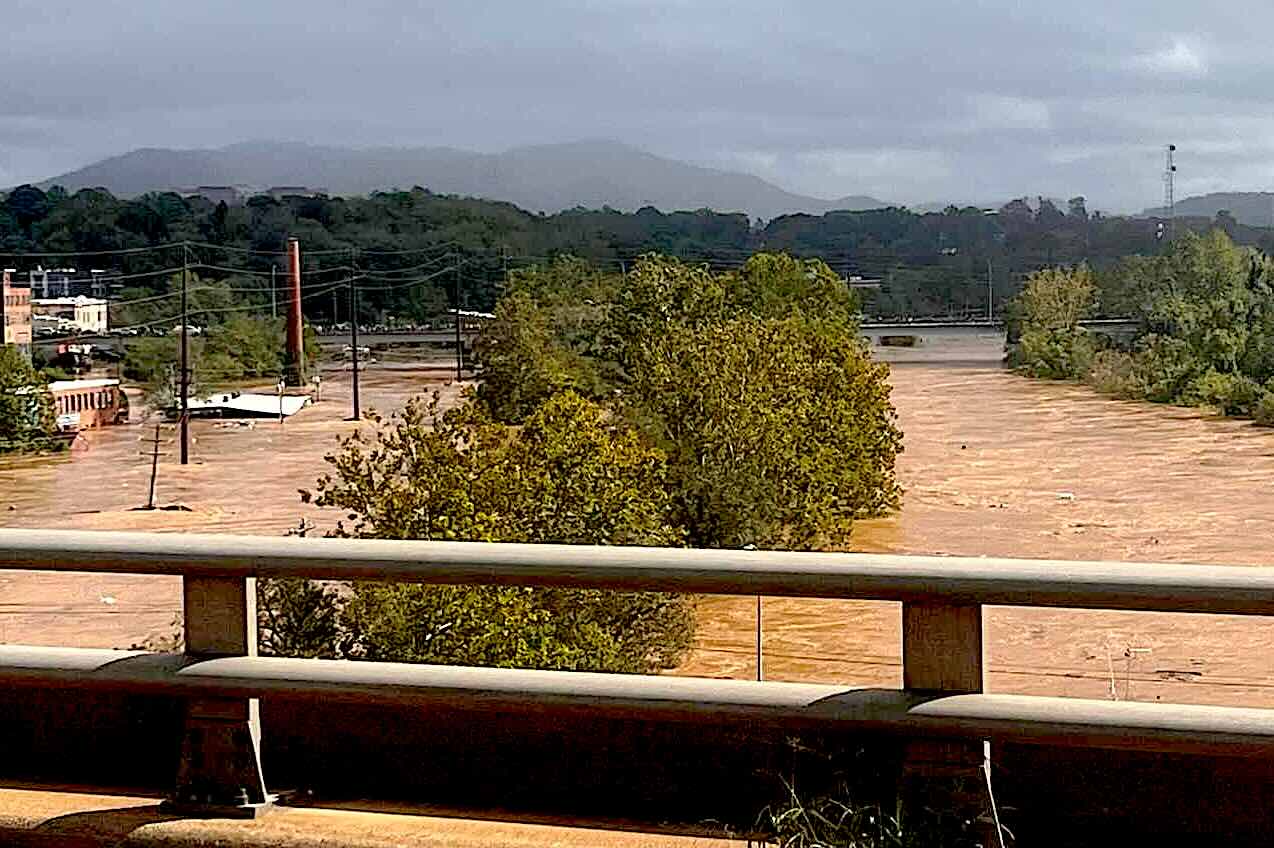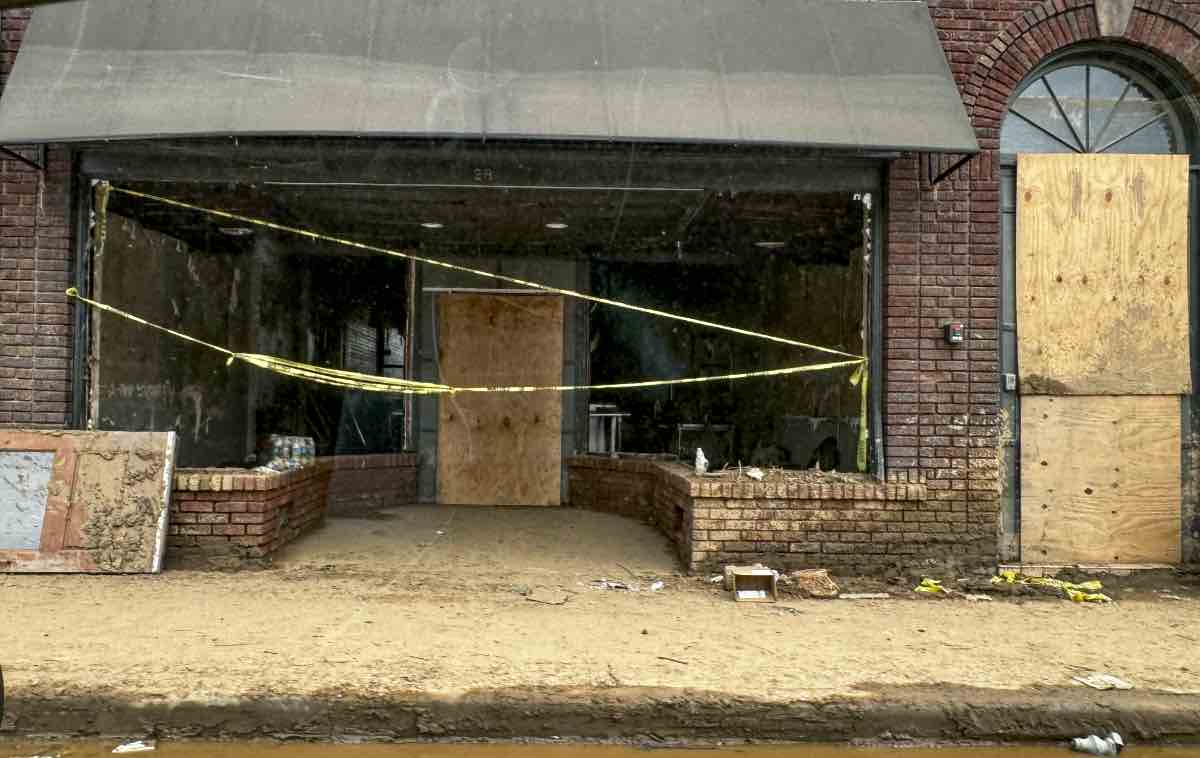

Welcome to this installment of The Intelligence Brief… over the last several days, recovery efforts have remained underway around the clock in regions of the Southeastern United States that have been affected by Hurricane Helene. In this special installment written from within the heart of Western North Carolina near Asheville, one of the areas most severely impacted by the storm, we’ll be looking at 1) the arrival of the storm and the historic flooding and other damage it caused, 2) the current state of relief and recovery efforts, and 3) the ongoing challenges those in affected areas are facing.
Quote of the Week
“We have biblical devastation through the county. We’ve had biblical flooding here.”
– Ryan Cole, Assistant Director of Buncombe County Emergency Services
The Latest From The Debrief
- Recent News Stories from The Debrief can be found here, and linked at the bottom of this newsletter.
- All the latest Podcasts from The Debrief can be found here.
- Watch the latest episodes of Rebelliously Curious and other videos from The Debrief here.
Special Report: Hurricane Helene Causes Unprecedented Damage in North Carolina
The date is Friday, October 4, 2024. The current time as I’m writing this is 3:18 p.m. ET, well after the time this newsletter is normally dispatched to email inboxes around the world.
As an editor, I loathe missing deadlines. However, it’s also rare to be reporting news that has affected my own region—and in fact, my own immediate neighborhood—so significantly as Hurricane Helene did once it reached my area just over one week ago.
A helicopter flies low over the valley just a short distance from my window, and I glance over to watch as it carries supplies toward the nearby city of Asheville, North Carolina. Air traffic like this has remained almost constant, as both private pilots and U.S. military aircraft have worked around the clock to transport resources, evacuate stranded residents, and aid in the ongoing search and rescue efforts for the countless number of people who remain missing.


Awaking today for the eighth consecutive day to a home with no power, water, or internet like so many other residents throughout the region, the pressing need for delivering food, water, batteries, candles and flashlights, and other resources to people in my community has taken precedence over journalism over the last week; a reality helped along by the lack of access to power, internet, and perhaps the most valuable commodity of all: information.
Ironically, during my collection and delivery of supplies to my neighbors, and to family members and others in need throughout my county, I was also aware that all the stories I would hear during my interactions with locals affected by the storm, as well as those from the countless relief workers and other volunteers who are here lending aid from surrounding regions, would become aspects of what I would eventually be reporting to our readers.


After days of shoveling heavy loads of gravel to assist in repairing washed out portions of rural driveways, and stopping in to speak with people at area businesses as they gradually regain power and reopen, the stories I have heard are unlike anything my community has ever faced. I say this, despite having worked in broadcast radio in the region in 2004 during Hurricane Ivan, which also caused severe flooding and devastation throughout the area. That event, however, was barely comparable to what people in Asheville and the surrounding area now are seeing.
With the death toll steadily rising in the region and hundreds of individuals still unaccounted for in Buncombe County alone, untold numbers of WNC residents continue to search for their loved ones, and contribute in the effort to provide relief in the aftermath of one of the greatest natural disasters ever to affect the region.
A Storm of Historic Proportions
At approximately 11:10 PM last Thursday, Hurricane Helene made landfall as a Category 4 hurricane in Florida’s Big Bend region, at that time with maximum sustained winds of close to 140 mph.
Although the potential for damage along the Gulf Coast was plainly evident for a storm of this magnitude, warnings were issued for communities much farther inland that were also expected to be impacted by the storm. Of the potential dangers to cities like Atlanta and the surrounding region, meteorologist Brad Panovich said last week that Helene “has the potential to be Atlanta’s Hugo,” in reference to the tropical storm that caused widespread damage along the southeastern coast in 1989.
Tornado warnings were soon being issued throughout the Carolinas as well, and on September 26, the National Weather Service’s Greenville/Spartanburg, South Carolina, office issued an urgent message, warning residents that Helene’s potential impact on Western North Carolina, with a specific focus on the Asheville area, was likely to be of both historic proportions and potentially deadly.


“This will be one of the most significant weather events to happen in the western portions of the area in the modern era,” the alert read. “Record flooding is forecasted and has been compared to the floods of 1916 in the Asheville area,” it continued, warning that Helene’s impact would also likely exceed the most significant recent past storms to strike the region.
“We plead with everyone that you take every single weather warning very seriously through the entirety of this event as impacts will be life-threating and make sure to have multiple ways to receive alerts,” the alert stated, adding, “We cannot stress the significance of this event enough. Heed all evacuation orders from your local Emergency Managers and go to a storm shelter if you do not feel safe at your location.”
Despite the severity of the NWS’s alert, many residents either missed the warning, or did not take it seriously enough.


Impact: Helene Strikes a Mountain Town
Heavy rain had already begun to arrive by the late afternoon of Wednesday, September 25, although the most significant effects of the storm wouldn’t arrive until Friday morning, when torrential rain and hurricane-force gusts made their way to the North Carolina mountains and portions of surrounding regions.
Strong winds coupled with sudden ground saturation and flash flooding brought down large trees throughout the area, which along with the flooding that ensued as rainwater made its way into the area’s river systems quickly pummeled the region. Roadways were flooded, bridges were washed away, vehicles were upturned, and homes were destroyed. By Sunday evening, my community had begun to receive dire reports about locations like Chimney Rock, Swannanoa, and other surrounding areas from firefighters, police, and other emergency workers passing through our community, all of whom said towns like these were now gone.


Many area residents, surprised by the sudden torrential flooding, were injured or killed as they attempted to escape their homes. Mike and Nora Drye, area residents and longtime friends of my family, were among those who lost their lives as the couple attempted to take shelter on the roof of their home amid rising flood waters.
Area resident Lance Wisely, the father of two children, Felix and Lucas, shared heartbreaking news on social media that his sons, along with their mother and another individual, were all presumed dead after they attempted to leave their home on Friday morning as the main surge of the storm swept over the region. According to Wisely’s account, a local man saw them attempting to leave their home and tried to help them escape.
“He was not successful and the river took them all,” Wisely wrote.
“What to say? This is more news than memorial,” Wisely said later in the posting, sharing words of admiration for the children, their mother Aly, and her partner Knox. “The boys were loved fiercely and generously by all of their grown ups,” he said. “It has been my great honor and pleasure and exhausting priviledge to be their father for their time in this world with us.”
Kristie, an area gas station employee in the community of Fairview whom I spoke with on Thursday morning, sat in the doorway of her business on guard amid reports of looting and theft in the area. A mother who resides in the nearby community of Leicester, I stood and spoke to her and her staff after providing her with candles and a flashlight for her home, which like so many others, has been without power for days. Kristie’s ordeal began as she and her family were returning from out of town several days ago when they encountered the severe flooding that impacted the region.
“We made it all the way to Old Fort, but it was gone,” she told me. The family, forced to take an alternate route, finally made it home, although her husband, who requires oxygen, is now short on supply.


How a Hurricane Devastated the High Country
For many, the mountainous region around Asheville, North Carolina would seem an unlikely area to be affected by hurricanes. However, meteorologists like Shel Winkley with Climate Central, a nonprofit research group, say that such areas are becoming prime candidates for such flooding amid rising global temperatures.
A report published by Climate Central in May outlined areas potentially at risk due to global warming. Among several of those the report identified as most at risk had been areas where remnants of Helene caused the most damage.


“Appalachia was named as one of the areas that had an outsized burden for future flooding,” Winkley told NBC News, referencing a report Climate Central published earlier this year that detailed locations with increased risk of inland flooding. According to the organization’s report, several of the areas that were the most adversely affected by Helene had been identified as being particularly at risk.
“This is an area that’s known to have the potential for more flood events and more costly flood events, as well,” Winkley told NBC News. “Unfortunately, that’s what we saw this past weekend.”
Ironically, the National Climatic Data Center is based here in Asheville, and its website was temporarily offlineearlier this week amid the widespread power outages affecting the region.
The National Oceanic and Atmospheric Administration (NOAA) has said that although the number of hurricanes is not expected to increase in the years ahead, the planet’s changing climate is likely to cause those which do occur to intensify.


Damage Assessments, and the Path Forward
The death toll from Hurricane Helene had reportedly risen to more than 200 as of Thursday evening, although many more horror stories I encountered from locals I spoke to point to much larger numbers of the dead and missing as search and rescue efforts remain underway.
“Simply put, we’re devastated,” said Asheville Sheriff Quentin Miller.
The BBC reported that more than half of the current number of reported deaths occurred in North Carolina, with a significant number—currently more than 70 deaths—in Buncombe County, where Asheville is located. Helene has now been declared the deadliest mainland storm to have occurred since Hurricane Katrina caused widespread destruction in New Orleans in 2005.
Half a million homes remain without power, and Buncombe County Officials reported that the number of missing individuals remained in the hundreds.


Earlier this week, President Biden visited the region, receiving an aerial tour of the damage and pledging that 100% of the emergency protective measure and debris removal expenses in North Carolina will be covered by the federal government, with the same extended to affected regions in Florida and Georgia over the next 90 days. Close to 9 million meals, 7.4 million liters of water, and other provisions have currently been shipped to the region.
However, with federal emergency management resources already being maxed out, US Homeland Security administrator Alejandro Mayorkas warned this week that FEMA, which arrived in Asheville several days ago, “does not have the funds to make it through the season and what… is imminent.”


“I don’t know where you run to escape climate change. Everywhere has some sort of risk,” said Cathy Dello, the state climatologist in North Carolina, in a statement provided to The Guardian.
“It’s really been quite rattling to see these places which you love be devastated, knowing they have been changed forever,” Dello said.
“We can’t just rebuild like before.”
Credits: As the recovery effort remains underway here on the ground in Asheville, where I reside, I would like to conclude this week’s Intelligence Brief with a personal note of thanks to my on-the-ground team here in Asheville, North Carolina, consisting of Matthew Oakley, Chris Heyes, Caleb Hanks, and Charlotte Hanks. Special thanks to Robert Ottey, Laura Varney, and Krista Banks for providing additional photography for this report. Lastly, thanks to my incredible team here at The Debrief who have kept normal operations underway while I have remained without power for more than a week.
Finally, I would also like to thank the remarkable number of individuals who have reached out and expressed concern for our community. Fortunately, like so many here in the Asheville area, the burden of this natural disaster has been eased by the kindness of neighbors doing what is truly the most important thing at times like this: being neighborly.
I hope I have succeeded at doing that also, in addition to conveying through words at least a small picture of the devastation we’ve all experienced to Intelligence Brief readers. In the days ahead with the restoration of power, water, and internet, I also hope that additional information about this unprecedented climate event and the damage it caused to my region and surrounding states can be reported here, along with all of the science, technology, and defense stories we endeavor to feature at The Debrief.
Micah Hanks, Editor-in-Chief, The Debrief
Friday, Oct 4, 2024, from Asheville, North Carolina
That concludes this week’s installment of The Intelligence Brief. You can read past editions of our newsletter at our website, or if you found this installment online, don’t forget to subscribe and get future email editions from us here. Also, if you have a tip or other information you’d like to send along directly to me, you can email me at micah [@] thedebrief [dot] org, or Tweet at me @MicahHanks.


Here are the top stories we’re covering right now…
- Edible Electronics: Toothpaste Ingredient Holds Key to Nano Machine Technology
A common tooth-whitening agent also works in nano transistors, and could open the door to safe and reliable “edible electronics.”
- Astronomers Reveal Presence of a Planet Orbiting Our Solar System’s Closest Single Star Just 6 Light Years Away
Astronomers using the ESO’s VLT say they have spotted a planet orbiting our solar system’s closest single star, a.k.a. Barnard’s star.
- Political Bias in AI: Research Reveals Large Language Models Are Consistently Left-Leaning, Raising Ethical Questions
Research shows that many large language models (LLMs) exhibit a consistent left-leaning political bias, raising ethical questions about AI.
- Brain Cells Are Responsible for Why You Perceive Time, New Study Reveals
A recent study by UCLA Health has shed new light on how the brain encodes and interprets the flow of time and human experience.
- Water World: Dwarf Planet Ceres Was Once Covered by an Ocean
A new study, published in Nature Astronomy, suggests that Ceres is far icier than once thought and may have once been a muddy ocean world.
- Geologists Uncover Mysterious Hidden Subduction Zone Beneath Pacific, Offering A Glimpse into Earth’s Ancient Interior
Geologists have uncovered a mysterious subduction zone deep beneath the Pacific Ocean, reshaping our understanding of Earth’s inner workings.
- Scientists in China Say They’ve “Shrunk” Down Augmented Reality Lenses to Fit into a Standard Pair of Glasses
Optical scientists in China conducted tests of a new augmented reality configuration that allows the lenses to fit in a standard pair of glasses.
- New Study Confirms: Critical Thinking Is Mentally Draining and Inherently Unpleasant
Science confirms what many have already suspected —critical thinking mentally draining and often unpleasant.
- Forget Electronics: Here Come “Orbitronics”
New research into “Orbitronics” can help make electronic devices of the future more environmentally friendly.
- Shocking New Evidence Suggests Norse Hunters Met Indigenous North Americans 500 Years Before Columbus
Shocking genetic evidence from walrus tusks suggest that Norse hunters may have met indigenous North Americans centuries before Columbus.
- New Research into Horseback Riding Complicates a 5,000-Year-Old Human Skeletal Mystery
Can horseback riding change the very structure of your skeleton? New research seems to complicate our understanding of how horses impacted early human skeletons.
- Meals on Heels: These Fish Have Evolved to Taste with their Feet
In two new studies, researchers reveal that the sea robin, a fish with legs, uses them to detect prey buried in the seafloor.
- Is this 1,000 Year Old Ancient Mysterious Seed the Basis for the Biblical “Balm of Gilead?”
Scientists have successfully grown a tree from a 1,000-year-old seed with some speculating that this could be the long lost “Balm of Gilead.”
- Project Pele: The Pentagon’s Ambitious Effort to Build a Portable Nuclear Reactor
This week, we look at Project Pele, the Pentagon’s ambitious new effort to construct a portable nuclear power source.
- Breakthrough Study Uncovers Source of Mysterious Sci-Fi-like “Biotwang” Sounds Emerging From the Depths of the Pacific Ocean
Scientists have finally confirmed the source of the mysterious “Biotwang” sounds recorded in the deepest regions of the Pacific Ocean.
- Alien Visitation Beliefs Are “Spiraling Out of Control,” Becoming a Societal Problem, Warns Prominent Philosopher
In a recent paper, a prominent philosopher argues that increased belief in alien visitation is fast becoming a widespread societal issue.
- James Webb Space Telescope Spots ‘Weird’ Galaxy Containing ‘Exotic’ Stars That May Be Universe’s ‘Missing Link’
Astronomers using the James Webb Space Telescope have spotted a ‘weird’ galaxy with ‘exotic’ stars that may be the universe’s missing link.
- Bird Flu Transmission is Defying Effective Control, Recent Study Reveals
Control strategies for bird flu are failing, according to findings from a recent study by researchers with The Pirbright Institute in Surrey, England.
- Salvatore Pais and the U.S. Navy’s ‘UFO’ Patent Controversy
Joining us this week, Salvatore Pais speaks with Micah and Tim McMillan for an on-the-record discussion about his mysterious U.S. Navy ‘UFO’ patents.
